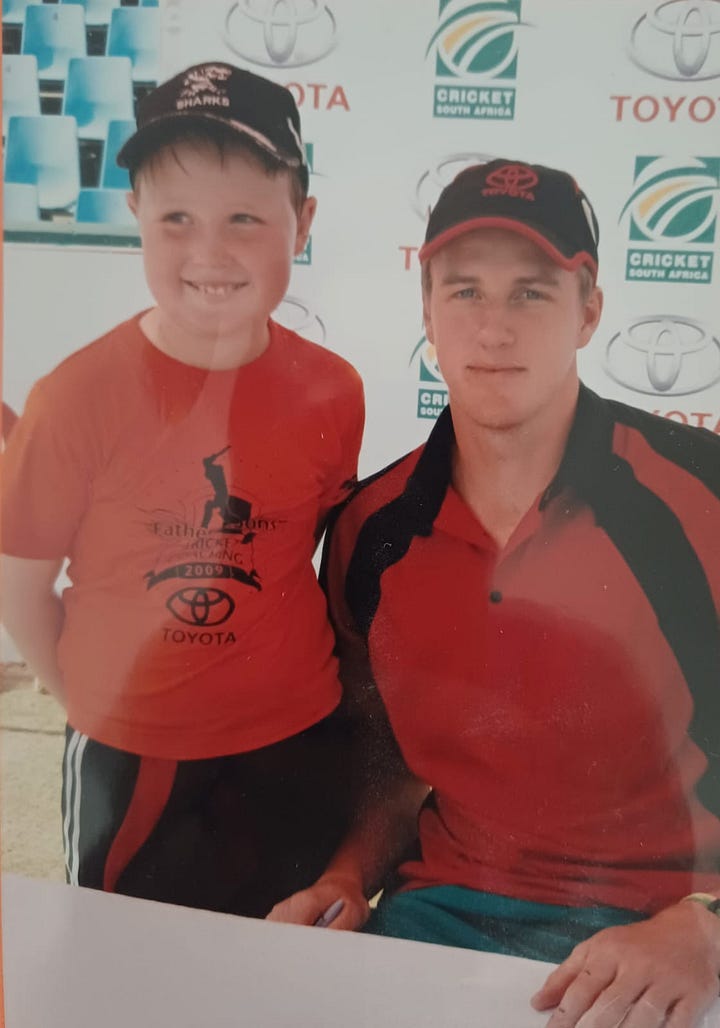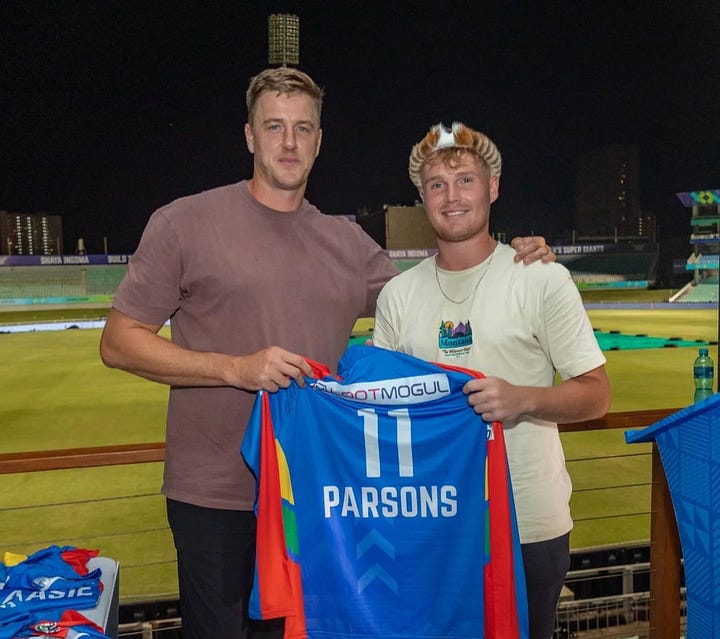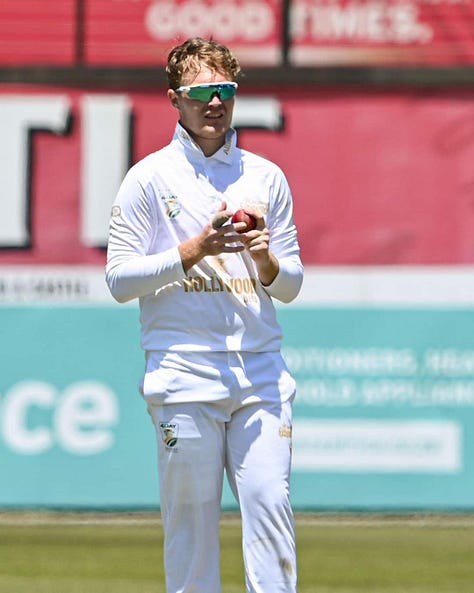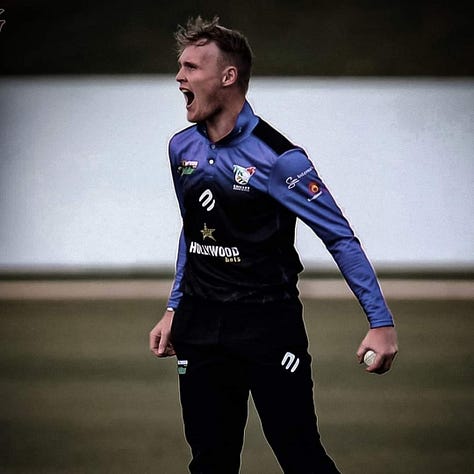The Sun Will Rise Tomorrow
Bryce Parsons, the Durban Super Giants' rookie, knows how to rise from adversity
Welcome back to the Rookie Series. “The Rookie Series”, as the name suggests, features the six rookies picked by SA20 franchises at the 2023 auction. These pieces are designed to bring these incredible young players closer to you, the fans. They draw the curtain and allow you to look into their world. It should be really fun. This week’s article is on Bryce Parsons, the Durban Super Giants’ rookie for 2024. Thanks, as always, for your support!
No. 1: Steve Stolk
No. 2: Ronan Herrmann
No. 3: Connor Esterhuizen
Bryce Parsons learned how to field in his bedroom. His mother, Beverly, would stand at the foot of the bed with a bat and hit balls to areas that would require Parsons to dive left, right and forward to catch the ball before it touched the bedding. Parsons was barely seven at the time, but in his head he was one of the greats holding on to match-winning catches.
He learned how to play with soft hands in the lounge. The Parsons household had an atmosphere of cricket. His father enjoyed cricket, his mother loved cricket and his sister was always ready to help him hone his skills. On match days, everyone rushed to finish whatever chores or duties that had to be taken care of - homework, cooking… whatever it was, they made sure it was done before kick-off. While the adults watched the match, the kids played their version.
“We had quite a big lounge at the time and Bryce and his sister used to play against the cupboard in the lounge while we had the TV on at the same time,” says Beverly.
Like any sibling contest, there was always a lot of arguing and fighting between Bryce and his sister. However, the biggest takeaway for Bryce from those matches was how to play with soft hands. Errant shots placed a lot of things in danger. “That is what makes my story different, I didn’t have a brother and played against my sister. She was quite a sporty girl. We just used to play a lot of backyard cricket as kids. We used to make the pitch quite short, so her bowling actually was at a decent pace. I remember back in the day used to spend plenty of hours just playing cricket together,” says Parsons.
Bryce learned how to compete and stand up for himself in backyard contests against his friends and older cousin. As a group, their life revolved around cricket. “We didn't really focus on anything else. There was always a bat and a ball and us having like a general game of cricket out there,” he says.
The competition level was high. All of them played for the same age group at Boksburg Cricket Club. On Friday nights they gathered to play for the same team. This is where he learned about teamwork.


This newsletter is 100% reader-supported. If you’re willing and able, please consider supporting it in one of two ways, leaving a tip or becoming a Patreon. Thank you so much for your time and investment!
Bryce Parsons was a little plump and could hit the ball a long way. The conclusion everyone at King Edward VII made was that he was a slogger. The school didn't need a slogger, they needed a proper batter. Gordon Matheson didn’t agree. He agreed that the school didn't need more sloggers, he didn’t agree that Parsons was one.
Matheson was the first team coach at KES and made it his business to keep an eye on the junior players. It helped him with planning and identifying players that needed to be fast-tracked. It baffled him why Parsons wasn't getting opportunities with the bat, the teen was so far down the order he barely contributed - a situation Parsons found deeply unsettling, it took a toll on his ego. Besides his mediocre pace bowling, which Parsons promptly dropped, everything Matheson saw at training told him that Parsons could play. Matheson made it his job to have conversations with other coaches so they could open their eyes to Parsons’ abilities.
“Other coaches didn’t want to pick him because of his weight, they just couldn’t look past it,” says Matheson. Jimmy Cook was the first coach Matheson convinced to take a look at Parsons at KES. Matheson asked the former Proteas opener to focus on the teenager’s numbers and not his physique. Cook relented and handed Parsons a debut against St. Benedict’s. Parsons vindicated Matheson’s efforts by scoring a century and bagging a five-wicket haul in the match.
Parsons’ weight wasn’t just a problem at KES. He also struggled to get selected for representative sides because all provincial coaches saw was a fat and unfit youngster. He held his own when in yo-yo tests, but that did not help change the perception coaches developed after just looking at him.
“It’s something he has had to live with all his life. But, what most people did not see was the work he put in. After he moved to the Dolphins, Bryce was always the first player to arrive at training. He ran laps around the ground and did gym work before others arrived,” says Beverly.
A strong work ethic is something that Parsons has always had. According to Matheson, at KES, Parsons lived in the nets. He had a partner-in-crime in Mitch van Buuren. They faced between 200 and 250 balls each, a day. When there were no coaches to feed them balls, they paired up and took turns at the bowling machines while the other batted.
Beyond a healthy work ethic, Parsons did not back down. When he was 12, Parsons had faced off with a 23-year-old Marchant de Lange in Premier League cricket, they might have revised their perspective of the youngster. “I remember the first time I faced him, I was just like, ‘I don’t think I'm quite ready for this,’” he says.
But, he didn’t retreat. After facing a couple of de Lange’s missiles, Parsons settled into his groove and batted with freedom against the nationally capped pacer.
The pitch was dry. The ball was turning square. Both teams opened with spin and the part-timers bowled when the frontline options needed a breather. It was one of those days when pace bowlers were in the team as fielders and might be required to contribute with the bat if the specialist batters failed. When Bryce Parsons walked in, the Dolphins were two wickets down with 20 runs on the board.



The previous night, Parsons had made the cardinal mistake when it came to social media and athletes. He went on Twitter (now X) and followed a conversation where fans discussed him and his abilities. “I had a bit of a nightmare a couple of innings before that, and the tweet said I hadn’t gotten over 20 in the last seven or eight innings. I remember sitting there thinking, ‘That's actually quite, quite bad. I need to I need to stop doing something,’” says Parsons.
After seeing the tweet, Parsons could have asked for a better wicket to bat on, if not to score a 50 or a 100, just for him to score more than 20 runs. In the first innings, Parsons had failed to pass the 20-run mark. He fell for 10 off 25, trapped lbw by Kyle Simmonds. With this kind of performance, it was difficult for him to beat the allegations that he was chronically unable to get going.
This was the first time Parsons had struggled in this manner. Whenever an opportunity came about at representative and schoolboy cricket, Parsons never struggled for runs. This is not to say he didn’t fail every now and then, he did. But, he always bounced back after a match or two. After joining the Dolphins, that is not the way things went for him. “It is a big jump from schoolboy and SA Under-19 cricket to professional cricket. You can't really prepare for the jump in a way, like, from schoolboy cricket to the professional game. You can only learn by playing at that level,” says Parsons.
Parsons found the tweet soul-crushing. Not because it was a lie, but because it held up a mirror to him. He was failing to live up to the standard he set for himself. “I think if it's not soul-crushing, it doesn't really mean a lot to you. So I feel like it's a good thing if you're upset. You can only use it to kind of drive you to where you want to be,” says Parsons.
In their second innings, the Dolphins needed 272 runs to win on a difficult pitch. If he had called his mother before the match, she would have told him what she always told him, ‘whatever happens, the sun will rise tomorrow.’ That is what she told him after he was not selected for the SA Under-19 2018 tour to England.
“In cricket, you learn to deal with failures from a young age. When you get a duck or a low score, you have to pick yourself up and find a way to deal with it. Setbacks are part of your career. I remember not making the SA 19 tour to go to England. That was probably the biggest, let's say most upsetting moment of my career,” says Parsons.
As he prepared to face the first delivery of the second innings, Parsons repeated his mother’s advice to himself and focused on the task at hand. He lost himself in the innings and before he knew what was happening, he found himself on 99. “I had a bit of luck along the way. I think you need that sometimes. But, it was a very special moment for me when I was on 99. And I somehow got the single to point. It was just a whole lot of emotions once I got that single,” says Parsons.
He finished the match unbeaten on 134. Parson was relieved he had broken the chain of low scores. He was happy to have contributed to his team’s victory and he was reassured that he belonged in top-flight cricket. It was a coming of innings.
If you found this interesting, please share it:
You can support Stumped! by leaving a tip:
Thanks for reading. Until next time… - CS





